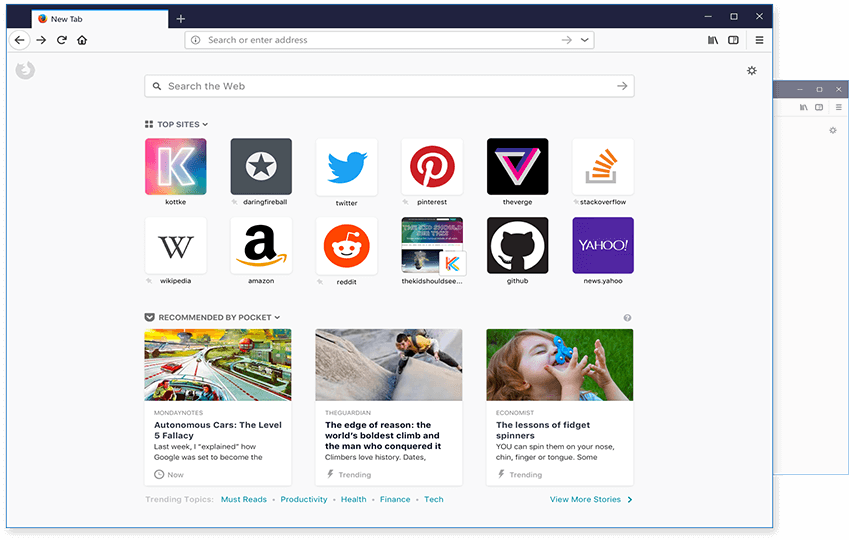A web browser is your gateway to the World Wide Web aka the internet. With tons of content for consumption available online, you need a browser that is up to the job, subject to your device’s capability.
Your choice for a web browser can mean the difference between staying safe online or joining the growing statistics of corporation, businesses, and individuals that have been hacked. Your choice for a browser also determine if you will have an smooth experience or you will be deviled with heating computer, noisy fan, poor and freezing performance, and faster draining battery.
Well, each year the developers of browsers try to outdo one another and 2018 is no different. Albeit a browser that led last year, might not be leading this year. It is a competition after all!
Top web Browser 2018
For 2018, we have rounded up a list of the best web browsers according to our daily experience. That said, below is our list in descending order of best performers.
#1 – Mozilla Firefox
Firefox has for long been overshadowed by Google’s Chrome browser; always coming in second place to Chrome. However, this year Mozilla gave the browser the biggest update it has ever gotten in 13 years.
Firefox has made a name for itself in being a trustworthy browser as it is backed up by a non-profit organization, Mozilla. That means they are not interested in aggregating your data for purposes of selling it to advertisers.
The browser also has a wide developer community contributing to its extensions market. Meaning you are certain to find just about any browser extension you need for the Firefox browser.
But most important recent development to happen on this browser, is the release of the Firefox Quantum late last year. That update made Firefox have browsing speeds more or less equal to that of Google Chrome. But without the bad habit of eating up too much RAM when you open too many apps.
Quantum also came with a new system for extensions, which prevents rogue developers from stealthily implanting malicious codes into the browser’s internal codes.
In our list, Firefox Quantum makes it to the top because it scores big on privacy and security (which it has always done) and the recent update that makes its speeds comparable to those of Chrome. Though is some pages Chrome still leaves it in the dust, but the fact that it is fast enough but and doesn’t eat too much device’s resources, is enough to say it is better than Chrome.
#2 – Google Chrome
Chrome has always been on top of the browser ranking list across the board and no one can question its speed. However, it is a nightmare for users with devices not rich in the hardware capability department. Chrome is a RAM memory hog, especially if you happen to open too many tabs on the browser at the same time.
Then again, it scores highly when it comes to stability, cross-platform availability, and minimum screen space. It also has the widest range of extensions of any browser, with a very active developer community supported by one of the world’s biggest tech companies.
However, if you are concerned about your online privacy, then Chrome might not be the browser for you. It a Google’s product, a company whose bread and butter comes from advertisement, and Chrome could have been made that pleasant to users, just so to lure in a many people as possible for the company to easily data mine from the browser.
But when it comes to user’s security. Chrome scores highly. Say what you like about Google, as much as they may spy (data mine) on you, they are very cautious not to let other third-parties (hackers) to get access to your accounts. Chrome has recently gone further to push harder for widespread adoption of HTTPS encryption, with the aims of making it the standard for websites across the internet.
Both Chrome and Firefox now support WebAuthn – a password-free logins to your online accounts – which could in the future replace conventional password or the two-factor authentication to logging in.
Chrome further offers additional features such as support for web app developers including features such as VR headsets support, and use of device’s sensors like ambient light sensors and accelerometer.
#3 – Opera
This is perhaps the most underrated browser of all time, making up just 1% of the browser market. The browser is clean, launches fast, and comes with useful free features (VPN, Turbo Mode, and Ad-Blocker) that are not available on its rivals.
If you are using a slow internet connection (dial-up network or your broadband ISP is acting up) turning on the Turbo Mode on Opera browser will compress the web traffic, routing it through the Opera servers and make your browsing faster.
Turbo Mode also reduces the amount of data consumed while browsing. Something that comes in handy if you are on a limited mobile plan. The browser’s Turbo Mode and VPN feature (though can’t all be turned on at the same time) can help you unlock content restrictions by your ISP. The browser also comes with a battery-saving mode, which give you extra minutes in between laptop or tablet battery re-charge.
#4 – Microsoft Edge
Microsoft’s choice default browser that ships with Windows 10 and unavailable to previous Windows versions. If you want to enjoy all the features Microsoft has baked into Windows 10, Edge is the best browser to use. It smoothly runs as a modern-styled app on tablet mode, has the best integration with Cortana, and has a superb reader mode.
#5 – Vivaldi
Vivaldi acknowledges the fact that you spend a lot of time in front of a browser. So they want you to customize your browser to your liking. You as the user have choice in the whole style and structure of the browser’s interface. You can dock websites as side panels, while using the main windows for main browsing.
It also comes with a pleasant tab stacking option, which enables you to group tabs and move them around if they’re too crowded. The browser is Chromium, meaning you can get its extensions from the Chrome Web Store; though some extensions might not work as well as they do on Chrome.
#6 – Internet Explorer
There was a time when IE was the de facto browser for most people around the globe. That was until Google released Chrome and things have never been the same for IE. These days, it is languishing in the forgotten history, despite Microsoft’s insistence in including it in Windows 10.
Not that there is something horrifically wrong with the browser. It is simply because they are other modern browser that can do the job faster, cleaner, and more secure. Nonetheless, IE remains a powerful, highly compatible browser which is ideal for use in PCs with less RAM and CPU power.
The browser also struggles when it comes to handling extensions; not that it has many to begin with! It also has very little customization options.
Tor Browser
Tor is not being ranked with the other browsers; and is most certainly not at the bottom of our list. Rather it is on a separate list of its own. As it is more than a browser, it is a whole suite of online security tool on its own.
It comes packed with a plethora of security tools to keep your online activity very discreet, untraceable, and away from prying eyes and eavesdropping ears. The reality is, Tor is not a browser for regular use. It is mostly used when you want to access the deep and dark web.
Its traffic is routed randomly through nodes across the globe making it very hard to trace you. It stores nothing on your device; no browsing histories, cookies, or caches. The browser itself does not install on your device; in fact you can run it from a USB stick, and no one will know you have it. It is by far the most secure browser in this list, but to some, the most complicated one to use.

